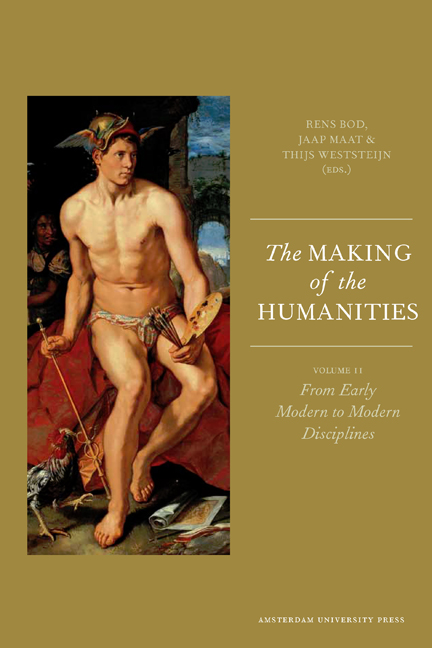Book contents
- Frontmatter
- Contents
- Introduction: The Dawn of the Modern Humanities
- I Linguistics and Philology
- II The Humanities and the Sciences
- III Writing History and Intellectual History
- IV The Impact of the East
- V Artworks and Texts
- VI Literature and Rhetoric
- VII Academic Communities
- Contributors
- List of Figures
- Index
The Scholarly Self: Ideals of Intellectual Virtue in Nineteenth-Century Leiden
Published online by Cambridge University Press: 19 January 2021
- Frontmatter
- Contents
- Introduction: The Dawn of the Modern Humanities
- I Linguistics and Philology
- II The Humanities and the Sciences
- III Writing History and Intellectual History
- IV The Impact of the East
- V Artworks and Texts
- VI Literature and Rhetoric
- VII Academic Communities
- Contributors
- List of Figures
- Index
Summary
Throughout the 1880s and early 1890s, Johannes Gerhardus Rijk Acquoy, Professor of Church History at Leiden University, used to invite his most talented students to a weekly privatissimum. In a room belonging to the university library, as close as possible to the books and manuscripts he needed, Acquoy taught his students the first principles of source criticism. More importantly, however, he also tried to mould their habits, their characters, their working manners, so as to transform them into real, scholarly church historians. He told them that scholarship worthy of its name depended on such character traits as truthfulness, circumspection, precision and ‘complete objectivity and impartiality.’ In particular, Acquoy emphasized that church historians must be ‘critical,’ that is, in the possession of an inquisitive mind, not easily satisfied, and unfailingly dedicated to the principle of asserting nothing that is not justified by primary source material. Church history had to be critical if it aspired to the status of scholarship.
In the historiography of the humanities, seminars such as Acquoy's privatissimum have often been seen as markers of professionalization and disciplineformation. In the history of historical writing, for example, the Ranke-inspired historisches Seminar is frequently treated, not merely as a breeding ground for modern, source-based historical studies, but also as the institutional arrangement through which ‘professionals’ distinguished themselves from ‘amateurs’ and thereby helped create a distinct professional identity. Arguably, the creation of such disciplinary identities was a major concern throughout the nineteenth century, not only for historians, but for scholars across the humanities. However, Acquoy's weekly gatherings in the university library do not only inform us about processes of discipline formation; they also bear witness to a widespread commitment to ‘critical’ history, ‘critical’ source evaluation, and ‘critical’ scholarship.
Whereas, by and large, the history of the humanities is often still written along disciplinary lines, I would like to propose a different, discipline-transcending perspective. I am interested, not in how figures such as Acquoy helped create a discipline, but in how they conceived of the persona of the historian. What sort of intellectual virtues did they attribute to him (never a her)? Whom did they identify as personifications of this ideal, and hence as model scholars?
- Type
- Chapter
- Information
- The Making of the HumanitiesVolume II: From Early Modern to Modern Disciplines, pp. 397 - 412Publisher: Amsterdam University PressPrint publication year: 2012
- 6
- Cited by



